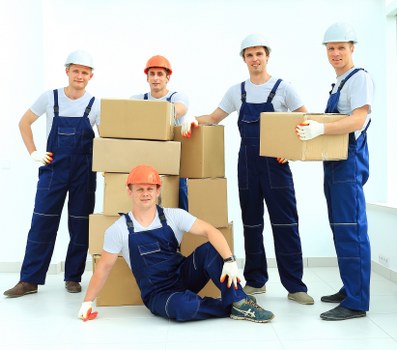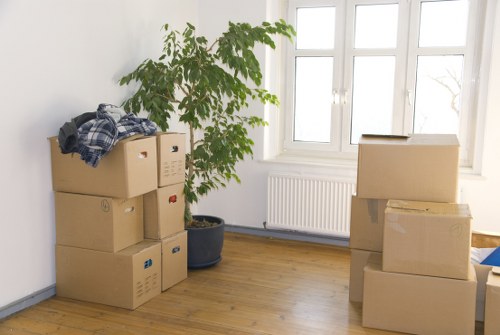Bulky Waste Collection Stevenage: Your Comprehensive Guide

Managing bulky waste can be a challenge for many residents of Stevenage. Whether you're renovating your home, clearing out a cluttered garage, or simply decluttering, knowing how to properly dispose of large items is essential. This guide provides detailed information on bulky waste collection in Stevenage, ensuring you handle your unwanted items responsibly and efficiently.
Bulky waste typically includes large items such as furniture, appliances, mattresses, and other oversized possessions that cannot be disposed of through regular waste collection services. Improper disposal of these items can lead to environmental issues and cluttered public spaces, making community efforts to manage bulky waste crucial.
In Stevenage, the local council offers a structured bulky waste collection service designed to help residents dispose of their large items safely. Understanding the regulations, scheduling pickups, and preparing your items for collection are key steps in the process.
Understanding Bulky Waste
Bulky waste differs from regular household waste due to its size and potential environmental impact. Common examples of bulky waste include:
- Old furniture such as sofas, chairs, and tables
- Large appliances like refrigerators, washing machines, and dryers
- Mattresses and box springs
- Electronic waste including TVs and computers
- Garden equipment and large toys

Proper disposal of these items is important to maintain a clean and healthy environment. The council in Stevenage has established guidelines to ensure that bulky waste is collected and processed in an environmentally friendly manner.
Recycling and reuse are prioritized in the bulky waste collection process. This means that many items are refurbished or repurposed, reducing the overall environmental footprint and supporting sustainable practices within the community.
Before arranging a collection, it’s advisable to assess the condition of your items. If they are still usable, consider donating them to local charities or second-hand shops. This not only helps others but also reduces the burden on waste management services.
Scheduling Bulky Waste Collection
To schedule a bulky waste collection in Stevenage, follow these simple steps:
- **Check Eligibility**: Ensure that the items you wish to dispose of are classified as bulky waste.
- **Booking a Pickup**: Visit the Stevenage Borough Council website or contact the waste management department to book a collection slot.
- **Prepare Your Items**: Place your bulky waste at the designated collection point, ensuring it is accessible for the collection team.
- **Follow Guidelines**: Adhere to any specific preparation instructions provided by the council to facilitate a smooth collection process.

It’s important to book your collection in advance, as slots can fill up quickly, especially during peak seasons like spring and summer. Early booking ensures that your bulky waste is collected at your convenience without unnecessary delays.
The council may offer periodic bulk waste collection days where multiple pickups can be arranged simultaneously. This is particularly useful for larger estates or community projects requiring multiple items to be disposed of at once.
Fees may apply for bulky waste collection, depending on the council’s policies and the volume of waste being collected. It’s recommended to inquire about any associated costs when scheduling your pickup.
Preparing Your Bulky Waste for Collection
Proper preparation of your bulky waste can significantly streamline the collection process. Here are some tips to ensure your items are ready:
- **Clean and Declutter**: Remove any personal belongings and clean your items to prevent contamination.
- **Disassemble if Necessary**: Break down large items like furniture to make them easier to transport.
- **Secure Loose Parts**: Use tape or ropes to secure any detachable components to prevent damage during transit.
- **Avoid Hazardous Materials**: Do not include items like paints, chemicals, or batteries, as these require special disposal methods.

Labeling your bulky waste can also help the collection team identify and sort items more efficiently. Clear labeling ensures that items are processed correctly and recycled or disposed of in the appropriate manner.
Having your items ready by the scheduled date prevents any last-minute issues. Ensure that the collection area is accessible and free from obstructions to facilitate an easy pickup.
If you have multiple items, arrange them in a way that maximizes space and minimizes the time needed for collection. Efficient arrangement benefits both you and the collection team, ensuring a quicker and more organized process.
Environmental Impact of Bulky Waste Collection
Effective bulky waste collection plays a vital role in environmental conservation. By ensuring proper disposal and recycling of large items, the environmental footprint is reduced in several ways:
- **Resource Conservation**: Recycling materials like metal, wood, and plastics reduces the need for raw material extraction.
- **Energy Savings**: Reusing materials consumes less energy compared to producing new items from scratch.
- **Reduced Landfill Use**: Proper bulky waste management decreases the amount of waste sent to landfills, prolonging their lifespan and minimizing pollution.
- **Lower Greenhouse Gas Emissions**: Recycling and proper waste management practices contribute to lower emissions of harmful greenhouse gases.

Community participation in bulky waste collection initiatives fosters a culture of sustainability and responsibility. Educating residents about the importance of proper waste disposal encourages more people to actively participate in recycling programs.
Local councils like Stevenage often collaborate with environmental organizations to enhance waste management strategies, promoting eco-friendly practices and innovative recycling technologies.
By adhering to the guidelines and utilizing the council’s bulky waste collection services, residents contribute to a cleaner and healthier environment for future generations.
Benefits of Using Stevenage's Bulky Waste Collection Services
Opting for the official bulky waste collection services in Stevenage offers numerous benefits:
- **Convenience**: Professional collection services handle the removal of bulky items efficiently, saving you time and effort.
- **Safety**: Proper handling by trained professionals minimizes the risk of injury or accidents during disposal.
- **Environmental Responsibility**: Ensuring your waste is disposed of correctly supports environmental sustainability and reduces pollution.
- **Cost-Effective**: In many cases, utilizing council services is more affordable than hiring private disposal companies.
- **Regulatory Compliance**: Adhering to council guidelines helps you stay compliant with local waste management regulations.
Nearby Areas for Bulky Waste Collection
Stevenage is surrounded by several areas that also benefit from efficient bulky waste collection services. Here are some of the nearby locations:
- Hatfield: Just 4 miles away, Hatfield residents can easily access Stevenage's collection services.
- Knebworth: Located 3 miles from Stevenage, Knebworth offers seamless bulky waste disposal options.
- Hitchin: Approximately 5 miles away, Hitchin maintains close ties with Stevenage for waste management.
- Codicote: Situated 7 miles north, Codicote benefits from Stevenage's comprehensive collection services.
- Wheathampstead: At a distance of 6 miles, residents of Wheathampstead can utilize the same efficient services.
- Cassils: Located 8 miles away, Cassils is another area served by Stevenage's bulky waste collection.
- Bilbrook: Just 5 miles from Stevenage, Bilbrook enjoys straightforward access to waste management services.
- Bedmond: Situated 4.5 miles away, Bedmond residents can easily schedule bulky waste pickups.
- Great Ashby: Approximately 3 miles from Stevenage, Great Ashby is well-served by the council’s services.
- Panshanger: At a distance of 6 miles, Panshanger benefits from nearby Stevenage's efficient waste collection.
- Kimberley: Located 5 miles away, Kimberley residents have convenient access to bulky waste services.
- Old Stevenage: Within 2 miles, Old Stevenage is closely connected to the modern waste collection infrastructure.
- Parker's Piece: Situated 4 miles from the center, Parker's Piece enjoys the benefits of reliable waste management.
- Woodfield: Approximately 3.5 miles away, Woodfield residents can easily arrange for bulky waste collection.
Important Guidelines and Regulations
Compliance with local regulations ensures that bulky waste collection is carried out smoothly and responsibly. Here are some key guidelines to follow:
- Item Restrictions: Certain items, such as hazardous materials and recyclable electronics, have specific disposal requirements. Always check the council’s prohibited items list before scheduling a pickup.
- Collection Schedules: Stay informed about the council’s collection schedules and plan your bulky waste disposal accordingly.
- Preparation Standards: Adhere to preparation standards, including proper disassembly and securing of items, to facilitate efficient collection.
- Volume Limits: Be aware of any volume limits imposed by the council to avoid additional fees or rejection of your waste items.
- Early Booking: Schedule your pickups in advance to ensure availability, especially during busy periods.
Tips for Efficient Bulky Waste Disposal
Maximize the effectiveness of your bulky waste disposal with these practical tips:
- Plan Ahead: Identify the items you need to dispose of well in advance to avoid last-minute stress.
- Organize Items: Group similar items together to streamline the collection and sorting process.
- Measure Space: Ensure your items fit within the designated collection area, allowing easy access for collectors.
- Coordinate with Neighbors: If you have multiple bulky items, coordinate with your neighbors to schedule a collective pickup, potentially reducing costs.
- Stay Informed: Keep up-to-date with any changes in council policies or collection schedules to ensure compliance.
Recycling and Reusing Bulky Waste
Recycling and reusing bulky waste items significantly contribute to environmental sustainability. Here are ways to ensure your bulky waste is effectively recycled or reused:
- Donate Usable Items: Items in good condition can be donated to charities, shelters, or second-hand shops, giving them a new life and reducing waste.
- Sell or Give Away: Utilize online platforms to sell or give away items, promoting reuse and saving resources.
- Recycle Materials: Ensure that recyclable materials like metal, glass, and certain plastics are separated and sent to appropriate recycling facilities.
- Repurpose Items: Consider repurposing old furniture or appliances for new uses, embracing creativity while minimizing waste.
Challenges in Bulky Waste Collection
While bulky waste collection services are beneficial, several challenges must be addressed to ensure their effectiveness:
- Accessibility: Ensuring that collection points are easily accessible for all residents, including those with mobility issues.
- Volume Management: Handling large volumes of waste, especially during peak seasons, requires efficient logistics and adequate resources.
- Public Awareness: Educating residents about proper disposal methods and the importance of recycling bulky waste is crucial for success.
- Environmental Concerns: Managing the environmental impact of waste collection processes, including emissions and resource use.
The Future of Bulky Waste Collection in Stevenage
Stevenage is continuously improving its bulky waste collection services to meet the growing needs of its residents. Future initiatives may include:
- Enhanced Recycling Programs: Expanding recycling capabilities to handle a wider range of materials more efficiently.
- Technology Integration: Utilizing advanced technologies for scheduling, tracking, and optimizing collection routes.
- Community Engagement: Increasing community involvement through educational campaigns and volunteer programs to promote sustainable practices.
- Partnerships: Collaborating with local businesses and organizations to develop innovative waste management solutions.
Frequently Asked Questions
1. What items are considered bulky waste in Stevenage?
Bulky waste typically includes large furniture, appliances, mattresses, electronics, garden equipment, and other oversized items that cannot be disposed of through regular waste collection services.
2. How do I schedule a bulky waste collection in Stevenage?
You can schedule a bulky waste collection by visiting the Stevenage Borough Council website or contacting their waste management department directly. It's advisable to book in advance to secure a convenient pickup slot.
3. Are there any fees associated with bulky waste collection?
Fees may apply depending on the volume of waste and the specific policies of the Stevenage council. It's best to inquire about any potential costs when scheduling your collection.
4. Can I donate or sell items instead of using the bulky waste collection service?
Yes, if your items are still in good condition, you can donate them to local charities, shelters, or second-hand shops. Alternatively, you can sell or give them away through online platforms to promote reuse and reduce waste.
5. What should I do with hazardous materials and electronics?
Hazardous materials and electronics require special disposal methods. Do not include them in your bulky waste collection. Instead, follow the council’s guidelines or take them to designated recycling centers to ensure they are handled safely and responsibly.